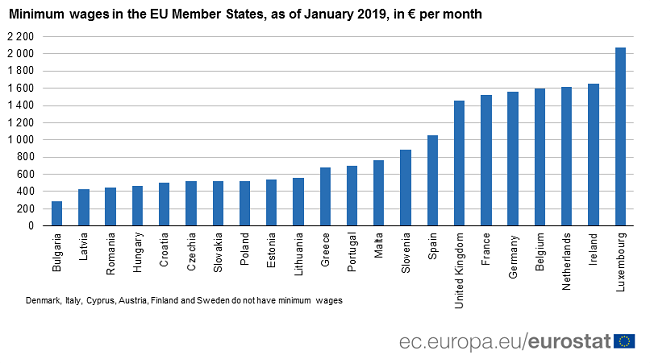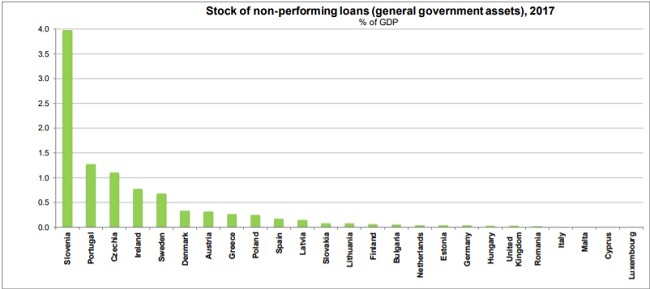Analytics, EU – Baltic States, Statistics, Wages
International Internet Magazine. Baltic States news & analytics
Tuesday, 23.12.2025, 09:01
Disparities in minimum wages across the EU
 Print version
Print versionMonthly minimum wages generally below €600 in east and above €1 400 in northwest of the EU
In January 2019, Bulgaria had the lowest gross* minimum wage (€286) across the EU. Nine Member States, all also located in the east of the EU, followed with minimum wages between €400 and around €600 per month: Latvia (€430), Romania (€446), Hungary (€464), Croatia (€506), Czechia (€519), Slovakia (€520), Poland (€523), Estonia (€540) and Lithuania (€555).
In five other Member States, located in the south of the EU, minimum wages ranged between €650 and just over €1 000 per month: Greece (€684), Portugal (€700), Malta (€762), Slovenia (€887) and Spain (€1 050).
In the remaining seven Member States, all located in the west and north of the EU, minimum wages were above €1 450 per month: the United Kingdom (€1 453), France (€1 521), Germany (€1 557), Belgium (€1 594), the Netherlands (€1 616), Ireland (€1 656) and Luxembourg (€2 071).
For comparison, the federal minimum wage in the United States was €1 098 per month in January 2019.

Smaller gaps in minimum wages once price level differences are eliminated
Across the 22 Member States concerned, the highest minimum wage in the EU was more than 7 times higher than the lowest.
However, the disparities in minimum wages across the EU Member States are considerably smaller once price level differences are eliminated: minimum wages in Member States with lower price levels become relatively higher when expressed in purchasing power standard (PPS), and relatively lower in Member States with higher price levels. By eliminating price differences, minimum wages ranged from 557 PPS per month in Bulgaria to 1 646 PPS in Luxembourg, meaning that the highest minimum wage was almost 3 times higher than the lowest.
Slovenia holds the highest level of non-performing loans
Slovenia has the highest stock of non-performing loans (asset) of general government. It stands at 4.0% of GDP, ahead of the two other EU Member States that recorded a share higher than 1%: Portugal (1.3%) and Czechia (1.1%). For Slovenia as well as for Portugal and Ireland, the majority of non-performing loans refer to loans of financial defeasance structure(s) which are classified in the general government sector. In the case of the Czechia, the figure mainly refers to the loans of national development banks classified in general government and to intergovernmental loans. Data are not yet available for three countries - Belgium, Croatia and France.









 «The Baltic Course» Is Sold and Stays in Business!
«The Baltic Course» Is Sold and Stays in Business!

